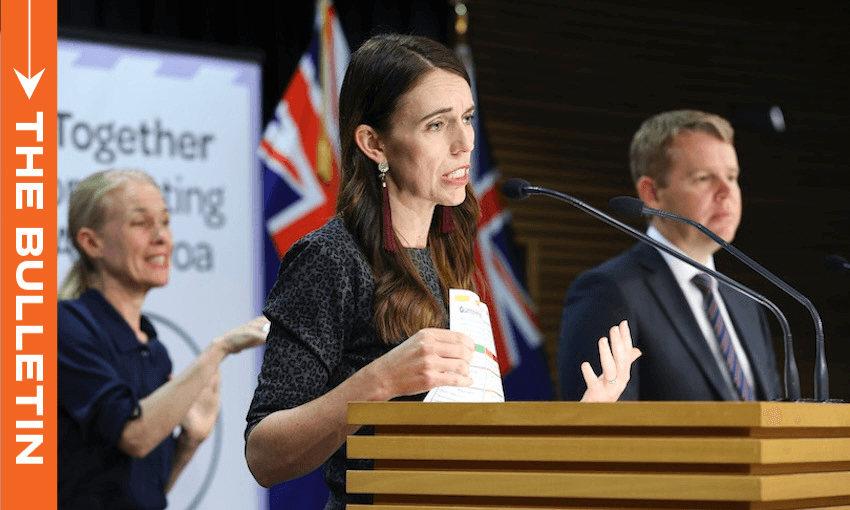Four ex-ministers say they’ve already given full evidence in private, but their successors accuse them of dodging public accountability, writes Catherine McGregor in today’s extract from The Bulletin.
To receive The Bulletin in full each weekday, sign up here.
Former Labour ministers defend inquiry no-show
To a greater or lesser extent, four former Labour ministers – Jacinda Ardern, Chris Hipkins, Grant Robertson and Ayesha Verrall – spent much of yesterday defending their decision not to appear at the Royal Commission of Inquiry into Covid-19. As summarised in a minute published by the commission this week, the four believed their attendance would have been “performative” rather than “informative” and expressed concerns that livestreamed or published evidence could be manipulated or misused, especially given reports of abuse towards earlier witnesses. All have already provided extensive private testimony – Ardern’s spokesperson said her most recent interview lasted three hours – and offered to answer any further questions in private, The Post’s Kelly Dennett reports (paywalled)
Writing in the Herald (paywalled), Thomas Coughlan says Ardern and her colleagues had good reasons to stay away: “What some of the royal commission hawks seem to want is not an inquiry, but a trial”, in which the ex-ministers are punished with a “brief, livestreamed public grilling for their perceived crimes”.
Government seizes on ‘gutless’ decision
Government ministers were swift to condemn the Labour group’s decision. As RNZ’s Russell Palmer reports, deputy prime minister David Seymour accused the group of “running from accountability”, contrasting their daily televised briefings during the pandemic with their reluctance to front now. Senior minister Chris Bishop said they were “ashamed of their record”, highlighting the “debt disaster” the government had inherited as a result of Labour’s pandemic-era spending. Justice minister Judith Collins called Ardern’s decision “gutless and hypocritical”, while foreign minister Winston Peters said the “Podium of Truth” – a reference to Ardern’s 1pm Covid-era updates – had become the “Podium of Evasion”.
Meanwhile prime minister Christopher Luxon stated confidently, but wrongly, that the four had defied a summons. In fact, explains Stuff’s Lloyd Burr, the commission confirmed it had decided against compelling attendance, judging that doing so would be adversarial and unlikely to yield new information. The chair, Grant Illingworth KC, said their non-appearance would not hinder the inquiry’s work, though public confidence might have been enhanced had they attended.
Phase two under fire
Hipkins has previously criticised the second phase of the inquiry – established by the current government – as “far more political” than the first, accusing it of providing a platform for “conspiracy theorist views”. He argued the terms of reference had been “deliberately constructed to achieve a particular outcome”, in part by excluding from consideration the period when Labour governed with NZ First. Phase two covers the years 2021 and 2022 only, and examines whether lockdowns, vaccine mandates, MIQ and other measures struck the right balance between public health and social and economic costs.
But the inquiry has also faced scrutiny from the right. Documents obtained by Newsroom’s Marc Daalder show Act’s Brooke van Velden, the minister responsible for royal commissions, was advised to press Illingworth to improve planning, risk assessment and reporting, warning that failure to deliver on time and within budget would “further undermine” confidence. Van Velden says she now has confidence in the chair and still expects the final report to be delivered to her by February 2026.
Debating the pandemic’s toll
While the inquiry probes the social consequences of the Covid-19 response, debate continues over its impact on mortality. Writing in The Spinoff last month, University of Canterbury epidemiologist Michael Plank examined claims that New Zealand dramatically under-reported excess deaths to the end of 2023. His team found total deaths between 2020 and 2023 were between 2% higher and 0.8% lower than expected – far below excess mortality rates in countries like the UK or US.
The timing of excess deaths closely matched Covid-19 waves, suggesting the virus, not indirect effects, was the main driver. Plank concluded: “New Zealand’s response was far from perfect, and there were undoubtedly harms as a result of lockdowns and other measures that are not reflected in mortality statistics. But there can be no doubt that the response saved thousands of lives compared with the alternatives.”
Subscribe to NameEmail+Subscribe

